Historic number of women announce candidacy for president
5 min read
Creative Commons
By MACKENZIE HARD
Staff Writer
Four women have announced their run for the 2020 presidential election so far, marking the greatest number in the last three election cycles. These women are Democrat Representative Tulsi Gabbard, Senator Kirsten Gillibrand, Senator Kamala Harris, and Senator Elizabeth Warren.
Senator Kirsten Gillibrand launched her campaign on Jan. 15 on CBS’ Late Show with Stephen Colbert. “I’m going to run for president of the United States because as a young mom, I’m going to fight for other people’s kids as hard as I fight for my own,” she said. In a clip released by CBS, she said that she would run a campaign that emphasizes health care as a human right while improving schools and job-training programs.
“I think that the changing ways candidates are announcing their campaigns is reflective of a larger shift in the way we view politicians and the process of running for office,” said English major and president of the Young Democrats, Shawnya Peterson.
“In 2019, we are feeling more connected to our elected officials than ever – for example, Alexandria Ocasio-Cortez is documenting her experiences as a freshman senator and dropping her skincare routine, all on her Instagram stories. In the lead up to 2020, I’m looking forward to seeing this gap narrow even further as we are reminded that not only are politicians people, but ordinary people can be politicians.”
Representative Tulsi Gabbard broke down barriers when she became the first Samoan-American and first Hindu elected to Congress. Before her election in 2012, she served in the Hawaiian Army National Guard. In the time since announcing her run, Gabbard has traveled to states including Iowa and New Hampshire, which have the earliest primaries.
Gabbard faces some controversy as a 37-year-old with limited congressional experience. Time Magazine reported that she has also faced criticism for helping her father’s “anti-gay organization, the Alliance for Traditional Marriage, around the early 2000s.”
The two-term Massachusetts senator, Elizabeth Warren, announced back in December that she was forming an exploratory committee to consider a presidential run. In this same announcement, she said that her experience growing up in a working class family will aid her in working to rebuild the middle class. She has advocated for progressive policies such as “Medicare for all.”
Warren has also faced controversy since she released the results of a DNA test. The test confirmed that she has Native American ancestry, but that those relations could be as far back as ten generations. NBC26 reported that Warren first faced scrutiny for her Native American heritage during her 2012 Senate race. President Trump has frequently mocked her with the nickname “Pocahontas.”
California Senator Kamala Harris announced she was running for president on Martin Luther King Jr. Day. During an appearance on Good Morning America, she said, “This is a moment in time that I feel a sense of responsibility to stand up and fight for the best of who we are.” If elected, Harris would be the first female African-American and first Indian-American president, as well as the first woman to hold the highest title in the country.
Senator Harris was a member of the Senate Judiciary Committee, which held hearings during Supreme Court Justice Brett Kavanaugh’s confirmation. During these hearings, Time Magazine reported on her tough questioning which aligned with her history as a deputy district attorney and then California’s attorney general.
For the most part, students are not yet sure who they will be voting for.
“I don’t really know much about any of the candidates,” said sophomore political science major Dillon Schweers. “I do know who Elizabeth Warren is since I recognize her name.”
“I personally right now know more about Kamala Harris and Elizabeth Warren, but that’s more based on name recognition rather than making any decisions on who I’d vote for,” said alumna Christina Amaral, class of 2018. “I definitely feel like a lot of things will shift as the election gets closer.”
“I don’t really know much about the female candidates,” said junior communications major, Faith Hogue. “So far I am really impressed with Beto O’Rourke and am very excited to see where he goes. I would love to see him as the Democratic candidate. He is very level headed and because of that I think Republicans who are anti-Trump could be convinced to vote for him. He might be what America needs to get rid of Trump.”
The only Republican currently on the ballot is President Trump. As president, he has passed a tax bill which lowered tax bills for about 80 percent of Americans, according to the Tax Policy Center. This presidency has also seen the unemployment rate remain low.
Forbes Magazine Online reported that in December of 2017, Congress cut government revenues by passing a $1.5 trillion tax cut. As of September of this past year, the cuts have not been linked to an increase in labor share or other investments.
“As a general rule, aspiring presidential candidates from the same party do not generally challenge a sitting president for the party’s nomination,” said political science professor Rosalyn Cooperman. “So while there are many Republicans, including a few women, such as former South Carolina governor and US Ambassador to the United Nations Nikki Haley, and US Senator Joni Ernst [Iowa], who may be interested in running, they are calculating whether it’s worth the grief to mount a primary challenge to Trump or just wait it out and run in 2024.”
Students here at UMW have wondered if a female president is possible in our nation’s future. Students also question what party these women would be a part of and what kinds of platforms they will base their candidacy on.
“I believe that Republicans will one day nominate a woman to be their president,” said political science major and chair of College Republicans, Stephen Lamm. “The Democrats have many prominent women within their party, while the Republican party, although headed by Ronna Romney McDaniel, still struggles with visible female leadership.”
Senior geology major Grace Rhil reflected on the growing importance of social media.
“I think that social media will play a continually larger role in each election because its prevalence in popular culture keeps growing,” she said. “It is also many people’s platform for getting news, so candidates will likely use that to their advantage.”
ABC News has also predicted that the electorate in 2020 is likely to be similar to that of the 2016 electorate.
“It is too early to determine what voter turnout in 2020 will look like. What we do know is that compared to men, women are more reliable voters. They turn out to vote in higher numbers than men, which has been the case for several decades now,” said Cooperman.











